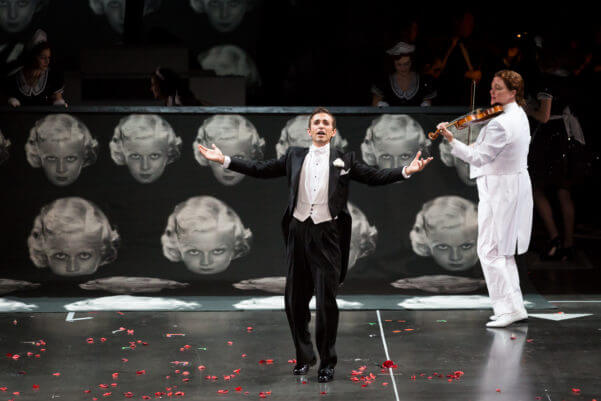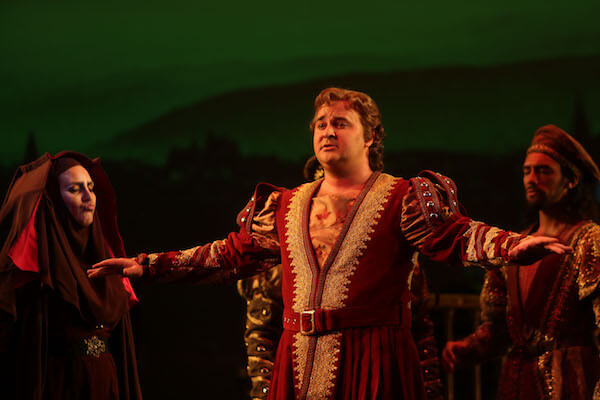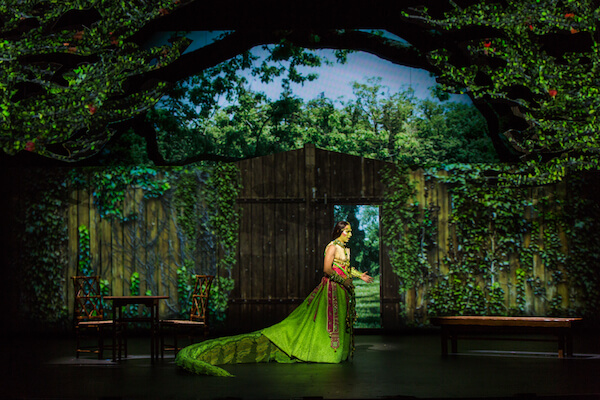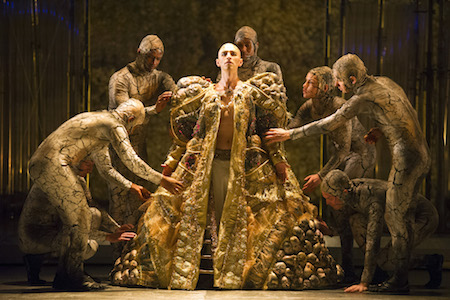Lyric Opera of Chicago’s creation, on December 7, of “Bel Canto,” a first opera by out gay Peruvian-born Jimmy López was a big deal. The work had been “curated” by Renée Fleming, creative consultant to the company, resulting, impressively, in a near sold-out run of nine performances. Television cameras filmed the sixth performance January 5 to prepare a PBS telecast.
López has had instrumental and chamber works commissioned by ensembles in Peru, the United States, and Europe, and the compositions give prominent place to percussion and brass, as is the case in “Bel Canto.” He has published very few songs; his only previous stage work was the ballet “Los Magos del Silencio.” So a first opera was a real departure.
At times his inexperience showed: fine — and evocative of a Peruvian setting — as the orchestration often was, it could prove excessive (the glockenspiel played havoc with the comprehensibility of text) and sometimes gave way to pompous Straussian blasts of no particular musico-dramatic relevance. But López shifts with facility among musical styles without sounding unduly derivative; his rhythmic sense is strong.
“Bel Canto,” “Dog Days” reflect contemporary concerns.
Melodic inspiration per se seems less evident in most of the vocal writing, though there are several skillful “dual duets” for the work’s two pairs of lovers and a beautiful prayer-like sequence for the character Carmen — a young, committed terrorist discovering a new world of literacy and feeling — ravishingly sung by mezzo J’nai Bridges.
Public interest in “Bel Canto” derives from its source, a bestselling 2001 novel by Ann Patchett, which itself was suggested by an actual kidnapping of hostages in a Lima embassy, an international quagmire that lasted months and ended violently. Patchett softened the story into a kind of magic realism, using an omniscient narrator to channel thoughts of many perpetrators and victims alike. Eventually, a (doomed) kind of Stockholm Syndrome-Utopian state descends, fueled by the radiant singing of an American diva, Roxane Coss, who largely suggests Fleming herself. Despite (or because of) massive linguistic non-comprehension, love affairs develop and young terrorists nurture unsuspected talents in the occupied vice-presidential mansion surrounded by law enforcement. Above all, “Bel Canto” is a sentimental fantasy of great singing’s universalized, transcendent power.
Cuban-American playwright Nilo Cruz changed many of Patchett’s details for his libretto. Unfortunately some of the discourse is “poetic” to a fault: impossible to parse with or without titles. The translator Gen, indispensible in the novel, loses status here since — inexplicably — even the terrorist generals can hold forth in complex English. (Andrew Stenson sounded fine, though Gen’s music lay low for him.) Often, even with titles, one simply didn’t know who was singing what. Sometimes Cruz improved on Patchett’s work: the terrorists’ political aims and the underlying social tensions are much more eloquently spelled out.
Alas, Cruz’s greater political seriousness is all thrown away in the post-“rescue” finale in which everything is sacrificed to provide a kind of New Age Liebestod for Roxane Coss, as if “moving on” from her blighted romance and aborted teaching of the vocally promising teenage terrorist Cesar trumped all other considerations the work has raised. This sequence read as empty operatic gesture musically, almost parody-level “Yankee Imperialism,” and also a testament to the ego of the work’s leading lady.
In no universe does the hard-working, pertly attractive Danielle de Niese command an instrument capable of the kind of transcendence the book’s central metaphor demands. Even if an announced sinus infection played a role in de Niese’s thin timbre and strain on high, she frankly sounded much like her usual soubrette self. Kevin Newbury — whose production was fluid and quite handsome (apt set and costumes, overbusy if occasionally revelatory projections) — crafted Roxane around de Niese’s reflex spunkiness rather than the practical gravitas implicit in Patchett’s heroine.
López doesn’t as yet provide specific idiolects to reflect and evoke the different characters, but Act Two does contain some attractive solo numbers turning the spotlight on their aspirations. Along with Bridges, the most compelling singing came from two excellent Juilliard-trained baritones, Jeongcheol Cha and Takaoki Onishi, as, respectively, a Japanese billionaire suitor of Roxane and a priest. As Cesar, Anthony Roth Costanzo — a highly skilled actor — unfurled his lovely countertenor gracefully. With excellent Spanish and unfailing dramatic resourcefulness, William Burden sang the Vice President fluently — but his music boasted little interest. Jacques Imbrailo showed artistry if a rather ordinary baritone as a neurotic Swiss Red Cross agent. With revisions, “Bel Canto” should be heard again.
January 8 at the Philharmonic brought on a rather disappointing concert under Alan Gilbert. The music director fared best with Sibelius’ tone poem “En saga.” His readings on the two great Richards, Wagner and Strauss, proved prosaic and less than sensitive to the needs of his singers, bass-baritone Eric Owens and soprano Heidi Melton. Melton has a gorgeous lower and middle voice but on this occasion was hard pressed on top notes, scarily so in “Cäcilie,” which should be prime turf for a Strauss soprano. Her Brünnhilde in the “Walkûre” final scene held vocal promise and feeling but needed greater verbal urgency.
Owens’ artistry is more developed in terms of line and text, but he seemed uncomfortable physically and was only in medium form — generous with dynamic variety but somewhat dry of timbre. Still, one looks forward to his role debut as Wotan, starting next season with Chicago’s “Rheingold.”
David T. Little and Royce Vavrek’s intense “Dog Days,” premièred in Montclair in 2012, finally made it to Manhattan in a short run at NYU’s Skirball Center. Seen January 11, the final night, the show as produced by Robert Woodruff and starring its original cast packed a huge punch, not just for the post-apocalyptic story but for the creative blend of compositional techniques — including some might scary white noise effects.
Vavrek’s libretto — embroidering on Judy Budnitz’s short story — begins with a grizzled patriarch roaring, “Get me my rifle” and seemed an apt, credible subject for the paranoid era of Cliven and Ammon Bundy. Disconnectedness, fear, and murderous hunger fuel the narrative of one “typical’ American farm family. Though well written, several key scenes — like the heartbreaking “mirror scene” of Lisa, the pre-teen protagonist — go on just a bit too long. The one element I found disappointing in relation to Budnitz was Lisa’s interaction with the doomed “dog man,” ably played by performance artist John Kelly: it didn’t add up to much emotionally. The Grand Guignol, ritualistic tragic ending proved mesmerizing.
Alan Pierson presided authoritatively over diverse musical forces, and the show was expertly engineered. Lauren Worsham, bridging music theater and classical singing, worked wonders as Lisa. Marnie Breckinridge’s pure soprano illuminated the Mother’s sad role. As the louche, Tennessee Williams-worthy brothers, tenors Peter Tantsits and Michael Marcotte had a field day, though Marcotte had some pitch issues. James Bobick’s Father, though unstinting dramatically, too often just roared incomprehensibly. But “Dog Days” felt like a genuine event.
David Shengold (shengold@yahoo.com) writes about opera for many venues.



































